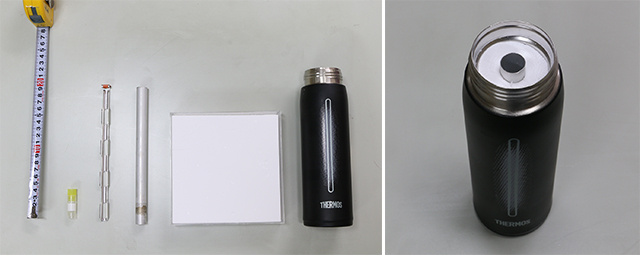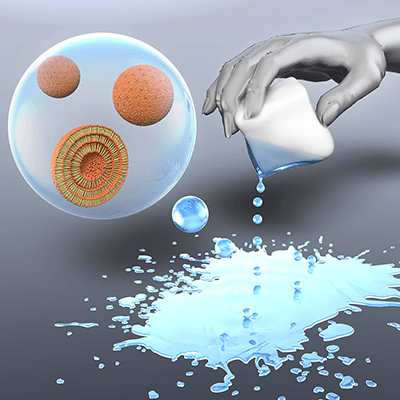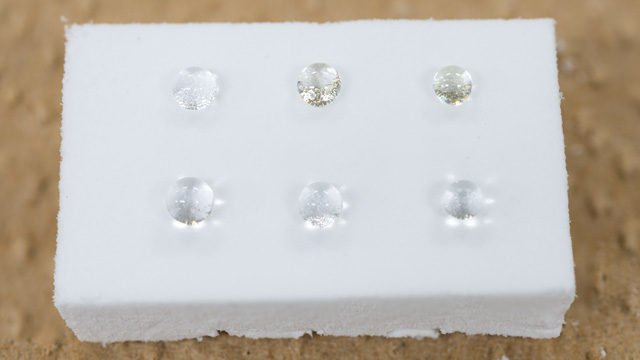Mechamical Properties
Marshmallow gel is flexible in compression and bending and recovers its shape immediately after unloading. This flexibility comes from flexible polymers and micrometer-scale structures. [1] It exhibits some flexibility even in liquid nitrogen (below the glass transition point). [2]
Cold resistance/Heat insulation
The mechanical properties of MTMS–DMDMS marshmallow-like gels hardly change from −130 to 320 °C. They have a low thermal conductivity of about 30 mW m−1K−1. By packing marshmallow-like gels in a thermos bottle and soaking with liquid nitrogen, it can be used as a simple transport container for frozen embryos. [3]

Sound and vibration absorption
The flexibility of the skeleton and the pores of the skeleton give marshmallow-like gels sound and vibration absorption properties.
Superhydrophobicity
Marshmallow-like gels have hydrophobicity.[2] This property is caused both by 2 reasons; 1) the geometrical rough surface, which is derived from a macroporous structure presumably formed by spinodal decomposition, and 2) by the many organic groups and relatively few hydroxy groups exposed on the surface. The contact angle of water droplet on any cut surface is above 150°.
Since the marshmallow-like gel of standard composition is hydrophobic and lipophilic, it can absorb and separate only oil from
Giant vesicle (liposome) formation
By absorbing and squeezing out buffer from a phospholipids-coated marshmallow-like gel, giant vesicle (liposome) dispersion can be prepared easily and

Surface Reactivity
In vinyltrimethoxysilane (VTMS)-
Surface-treated marshmallow gel will repel various organic liquids such as hexadecane.

References
- Hayase, G.; Kanamori, K.; Nakanishi, K. New Flexible Aerogels and Xerogels Derived from Methyltrimethoxysilane/dimethyldimethoxysilane Co-Precursors. J. Mater. Chem. 2011, 21, 17077–17079. doi:10.1039/C1JM13664J
- Hayase, G.; Kanamori, K.; Fukuchi, M.; Kaji, H.; Nakanishi, K. Facile Synthesis of Marshmallow-like Macroporous Gels Usable under Harsh Conditions for the Separation of Oil and Water. Angew. Chem. Int. Ed. 2013, 52, 1986–1989. doi:10.1002/anie.201207969
- Hayase, G.; Ohya, Y. Marshmallow-like Silicone Gels as Flexible Thermal Insulators and Liquid Nitrogen Retention Materials and Their Application in Containers for Cryopreserved Embryos. Appl. Mater. Today 2017, 9, 560–565. doi:10.1016/j.apmt.2017.10.004
- Hayase, G.; Nomura, S.-I. M. Large-Scale Preparation of Giant Vesicles by Squeezing a Lipid-Coated Marshmallow-like Silicone Gel in a Buffer. Langmuir 2018, 34, 11021–11026. doi:10.1021/acs.langmuir.8b01801
- Nomura, S. M.; Shimizu, R.; Archer, R. J.; Hayase, G.; Toyota, T.; Mayne, R.; Adamatzky, A. Spontaneous and driven growth of multicellular lipid compartments to millimeter size from porous polymer structures. ChemSystemsChem 2022, 4, e202200006. doi:10.1002/syst.202200006 (Open access)
- Hayase, G.; Kanamori, K.; Hasegawa, G.; Maeno, A.; Kaji, H.; Nakanishi, K. A Superamphiphobic Macroporous Silicone Monolith with Marshmallow-like Flexibility. Angew. Chem. Int. Ed. 2013, 52, 10788–10791. doi:10.1002/anie.201304169